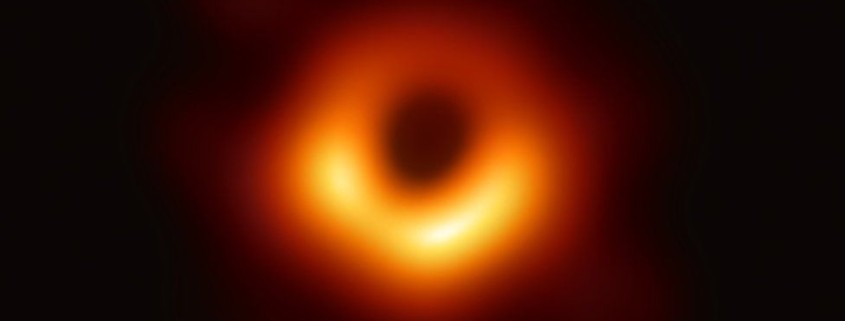Black holes, Einstein, and the gift of questions
My mind went to Madeleine L’Engle last week when I saw the first picture of a black hole.
Science, astronomy, physics, quantum mechanics — all those things caught her imagination. In And It Was Good: Reflections on Beginnings, Madeleine writes about how she and her husband (Hugh Franklin) would gaze at the stars, “seeing out to the furthest reaches of space and time.” The “wild and wonderful universe” was a familiar topic in her fiction and nonfiction.
“Everything changes with every major scientific discovery,” Madeleine L’Engle said to a forum audience more than a decade ago.
She mused on black holes in that speech, which was called “Searching for Truth Through Fantasy.” “We don’t understand black holes,” she said. “But maybe if we get through one, we would come out into another universe, something quite different, yet it would still be God’s universe.”
The news was another confirmation of Albert Einstein’s theory of general relativity. As the New York Times reports, “General relativity led to a new conception of the cosmos, in which space-time could quiver, bend, rip, expand, swirl like a mix-master and even disappear forever into the maw of a black hole.” (I don’t really understand it, either.)
To Madeleine, Einstein was a theologian of the highest esteem. Madeleine often found herself defending the role of science in religion. Science “won’t do anything to change the nature of God, any more than Galileo’s discoveries changed the nature of God,” she wrote in And It Was Good.
The picture of the black hole only brings up more questions. For one thing, what happens to stuff that falls into a black hole? What’s the force in the black hole?
I think Madeleine would’ve loved it.
“I like things that do not have explanations,” she said to that audience so long ago.
Madeleine continuously spoke and wrote about the importance of asking good questions, and not being hung up on answers. For her, the mysteries of science were a window onto creation. In A Rock That Is Higher: Story as the Search for Truth, she says:
When we human creatures opened the heart of the atom we opened ourselves to the possibility of terrible destruction, but also—and we tend to forget this —- to a vision of interrelatedness and unity that can provide a theology for us to live by.
She continues later.
The discoveries made since the heart of the atom was opened have changed our view of the universe and of Creation. Our great radio telescopes are picking up echoes of that primal opening which expanded into all the stars in their courses. The universe is far greater and grander and less predictable than anyone realized, and one reaction to this is to turn our back on the glory and settle for a small, tribal god who forbids questions of any kind. Another reaction is to feel so small and valueless in comparison to the enormity of the universe that it becomes impossible to believe in a God who can be bothered with us tiny, finite creatures with life spans no longer than the blink of an eye. Or we can simply rejoice in a God who is beyond our comprehension but who comprehends us and cares about us.
The new glimpse at the universe given to us last week is a reminder to be open to revelation and to keep asking questions.
— Erin F. Wasinger for MadeleineLEngle.com.


 Michigan State University
Michigan State University